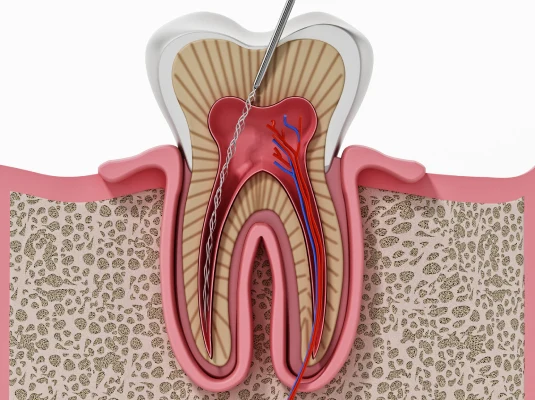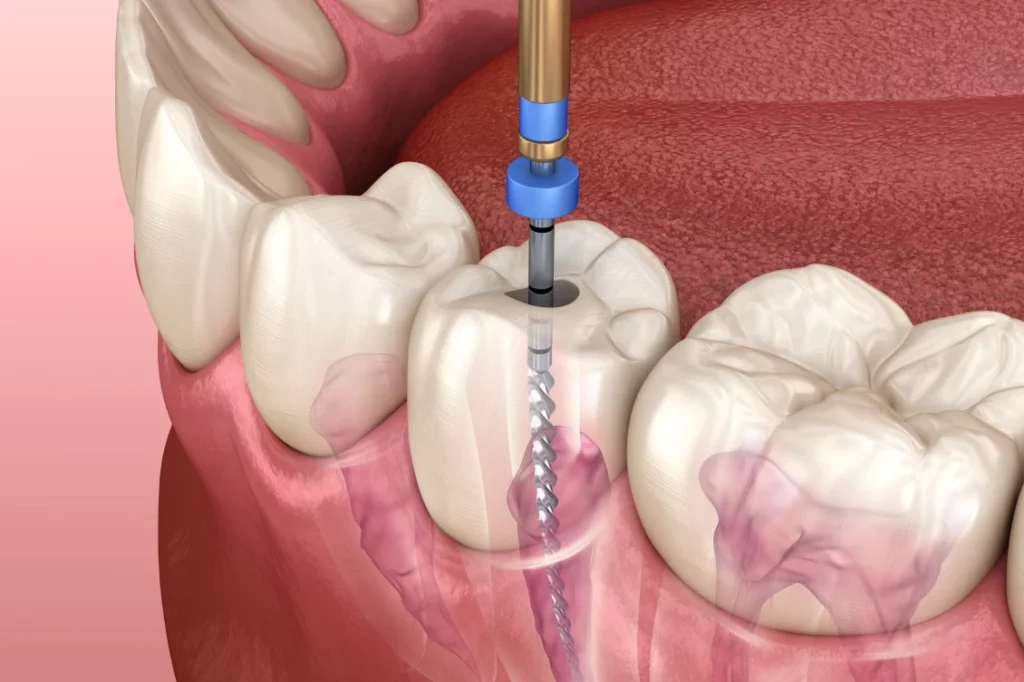Are you dealing with a failed root canal procedure that didn’t go as expected? Root canals are important treatments to fix teeth that are infected or decayed. But sometimes, they don’t go as planned. A root canal aims to remove infected parts from a tooth. Sometimes, urgent root canal treatments are needed to ease pain from an infected tooth. When done right, they protect the tooth. But not every root canal works well.
If you’re facing issues with a failed root canal, this guide can help you figure out what to do next to save your tooth.
Common Signs of a Failed Root Canal
A root canal is a common procedure aimed at saving a tooth and has a high success rate. However, like any treatment, it can sometimes result in failure.
Recognizing the Symptoms of a Failed Root Canal
After a root canal, it’s important to be aware of signs indicating it may not have been successful. Despite proper care, complications can arise.
Swelling After Tooth Treatment
If you notice swelling around the treated tooth shortly after the procedure, it could indicate an infection that needs immediate attention. Swollen tissue may be sensitive and produce pus.

Soreness After Failed Root Canal
Experiencing soreness for several days post-root canal could be a red flag. Severe pain or initial relief followed by recurrence could suggest a failed root canal.
Pain and Discomfort During Root Canal Recovery
Pain and discomfort during recovery, especially with hot or cold drinks, are common. However, persistent or severe pain warrants professional evaluation.
Leakage of Pus or Blood From Gums Post Tooth Treatment
Pus or blood leakage from the gums surrounding the treated tooth may signal the onset of an abscess. Prompt examination is necessary due to associated discomfort.
Back Tooth Infection Causing Maxillary Sinus Infection
Infections from back teeth can spread to the maxillary sinus, causing congestion, runny nose, bad breath, and facial pain. Consultation with a dentist is vital if these symptoms arise.
Pimples or Boils On The Jaw Indicates Root Canal Failure
Persistent pimples or boils on the jaw could indicate a failed root canal. The body’s drainage system may try to expel pus, indicating potential issues with the procedure.
What are the Causes of a Failed Root Canal?
Causes of a failed root canal can include:
- Incomplete cleaning of the root canal, leaving behind infected tissue.
- Additional canals in the tooth that weren’t treated during the initial procedure were undetected.
- Poor sealing of the tooth, allowing bacteria to re-enter and cause infection.
- Fracture or damage to the tooth after the root canal.
- Curved or narrow canals make thorough cleaning difficult.
- Resilient bacteria withstand disinfectants used during the root canal procedure.
- Delayed placement of a permanent filling or crown exposes the tooth to reinfection.
- Dental issues such as periodontal disease or new decay can impact the treated tooth.
- Failure to address the initial infection or trauma that required the root canal.
- Inadequate restoration of the tooth’s natural function and strength post-procedure.
How can you Treat a Failed Root Canal?
Here are some common ways to treat a failed root canal:
Retreatment of the Root Canal:
If the root canal wasn’t fully cleaned or sealed, your dentist may suggest redoing the procedure. This involves reopening the tooth, cleaning the canals again, and sealing them properly.
Apicoectomy:
In this surgery, the dentist removes the tip of the tooth’s root and seals it to prevent further infection. This option is considered when redoing the root canal isn’t possible.
Tooth Extraction:
Extraction may be necessary if the tooth is badly damaged or other treatments won’t work. After extraction, dental implants or bridges can replace the missing tooth.
Endodontic Surgery:
Specialized procedures may be needed to reach areas of infection that regular treatments can’t address.
Antibiotic Treatment:
Sometimes, antibiotics are prescribed alongside other treatments to control the infection.

Monitoring and Maintenance:
The dentist may monitor the tooth closely and recommend regular cleanings and check-ups in less severe cases.
Understanding the symptoms, causes, and treatment options for a failed root canal is essential for maintaining good dental health. By recognizing the signs early and seeking prompt treatment from a qualified dentist, you can prevent further complications and preserve the health of your teeth. Proactive dental care is key to preventing and managing dental issues effectively.
Schedule an appointment with Palisades Dental Care, Dumont, NJ
Ready to address your concerns about a failed root canal? Contact Palisades Dental Care in Dumont, NJ, for expert evaluation and personalized treatment options. Book your appointment online or call us at (201) 279-0440 for new patients and (201) 568-9811 for existing patients.
FAQs
Can a failed root canal cause severe pain?
A failed root canal can lead to persistent or severe pain, indicating underlying issues that need immediate attention from a dentist.
What are the common causes of a failed root canal?
Some common causes of a failed root canal include incomplete cleaning or sealing, persistent infection, fractures in the tooth, or complications during the initial procedure.
Is retreatment the only option for a failed root canal?
Depending on the severity and underlying cause of the failure, other options like apicoectomy, tooth extraction, or endodontic surgery may be considered to address the issue effectively.


